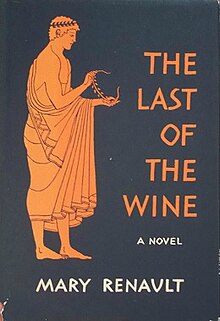The Last of the Wine

First US edition
|
|
| Author | Mary Renault |
|---|---|
| Country | South Africa |
| Language | English |
| Genre | Historical novel |
| Publisher |
Longman, Green & Co (UK) Pantheon Books (US) |
|
Publication date
|
1956 |
| Media type | Print (Hardback) |
| Pages | 350pp (1958 hardback) |
| OCLC | 47781915 |
| 823/.912 21 | |
| LC Class | PR6035.E55 L37 2001 |
The Last of the Wine is Mary Renault's first novel set in ancient Greece, the setting that would become her most important arena. The novel was published in 1956 and is the second of her works to feature male homosexuality as a major theme. It was a bestseller within the gay community. The book is a portrait of Athens at the close of the Golden Age and the end of the Peloponnesian War with Sparta, and includes Socrates as a character.
The novel is narrated by Alexias, a noble Athenian youth, who becomes a noted beauty in the city and a champion runner. The novel suggests that young male Athenians were treated almost like modern debutantes and wooed by older men seeking to be their lovers; in fact, in a memorable passage, Alexias' father, Myron, himself a former beauty and champion athlete, writes to his son before leaving Athens for the Sicilian Expedition. The father imparts to the son the traits he should seek in a lover – qualities like honor, loyalty and courage. However, the father also warns the son not to become involved with women as he is much too young. (See Athenian pederasty.)
As an Ephebe (adolescent male), Alexias falls in love with Lysis, a man in his 20s – a champion pankratiast and a student of Socrates. The novel follows their relationship through the Peloponnesian War, the surrender of Athens, the establishment of the Thirty Tyrants rule over Athens, the democratic rebellion of Thrasybulus and shortly after. The story ends with first hints of the eventual trial of Socrates for teaching blasphemy and sowing social disorder.
From the beginning of the novel, Socrates figures prominently; both Alexias and Lysis become his students in their youth. Socrates was very prominent around the city, always talking to new people. Also characterized in the novel are Plato and several figures from his Dialogues who were Socrates' students, including Xenophon, Crito and Phaedo. Another historical figure who figures in the story, albeit mostly off-stage, is Alcibiades, the Athenian general who flees Athens on a charge of sacrilege and functions as a military adviser to Sparta until he is recalled by a resurgent democracy in Athens. Alexis and Lysis serve under Alcibiades' command until his carelessness leads the fleet to disaster and he once again goes into exile.
...
Wikipedia
